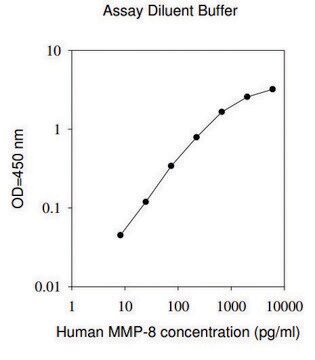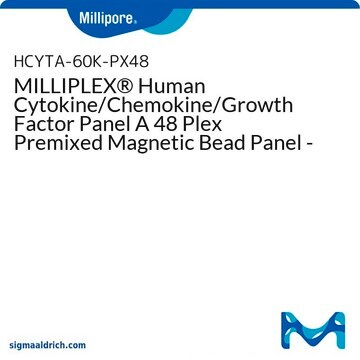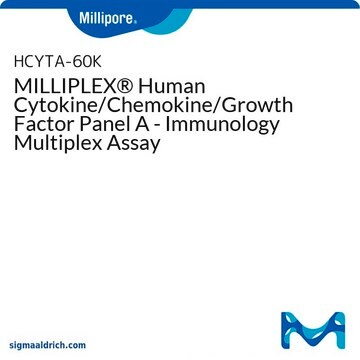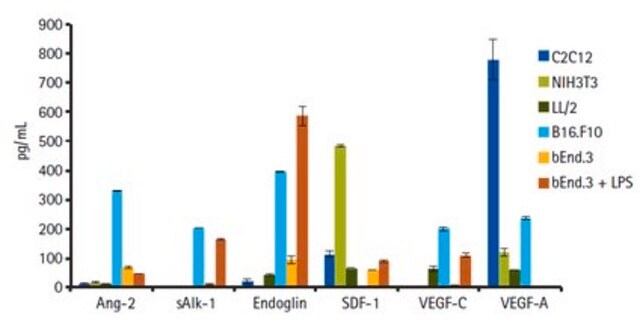HBNMAG-51K
MILLIPLEX® Human Bone Magnetic Bead Panel - Bone Metabolism Multiplex Assay
The analytes available for this multiplex kit are: ACTH, DKK-1, FGF-23, IL-1β, IL-6, Insulin, Leptin, Osteocalcin, OPN - Osteopontin, Osteoprotegerin, PTH, SOST, TNF-α.
Synonym(s):
human bone metabolic biomarkers immunoassay panel, luminex human bone metabolism multiplex assay, millipore human bone metabolic biomarkers multiplex kit
About This Item
Recommended Products
Quality Level
species reactivity
human
manufacturer/tradename
Milliplex®
assay range
accuracy: 82-97%
standard curve range: 0.24-1,000 pg/mL
(TNFα)
standard curve range: 1-3,000 pg/mL
(IL-1β)
standard curve range: 1-6,000 pg/mL
(ACTH & IL-6)
standard curve range: 146-600,000 pg/mL
(OC)
standard curve range: 24-100,000 pg/mL
(SOST)
standard curve range: 37-150,000 pg/mL
(FGF-23)
standard curve range: 49-200,000 pg/mL
(Leptin)
standard curve range: 5-20,000 pg/mL
(DKK-1)
standard curve range: 5-20,000 pg/mL
(PTH)
standard curve range: 61-250,000 pg/mL
(Insulin)
standard curve range: 7-30,000 pg/mL
(OPG)
standard curve range: 98-400,000 pg/mL
(OPN)
technique(s)
multiplexing: suitable
detection method
fluorometric (Luminex xMAP)
shipped in
wet ice
General description
MILLIPLEX® Human Bone Magnetic Bead kit is to be used for the simultaneous quantification of any or all of the following analytics in human plasma, serum or tissue/cell lysate and culture supernatant samples: Adrenocorticotropic Hormone (ACTH), Dickkopf-1 (DKK1), IL-6, Insulin, Leptin, TNFα, Osteopotegrin (OPG), Osteocalcin (OC), Osteopontin (OPN), Sclerostin (SOST), IL-1β, Parathyroid Hormone (PTH) and FGF-23. This kit uses a 96-well format, contains a lyophilized standard cocktail, two internal assay quality controls and can measure up to 38 samples in duplicate.
The Luminex® xMAP® platform uses a magnetic bead immunoassay format for ideal speed and sensitivity to quantitate multiple analytes simultaneously, dramatically improving productivity while conserving valuable sample volume.
Panel Type: Bone
Specificity
No cross reactivity between the antibodies for an analyte in this panel were observed.
Application
- Analytes: ACTH, DKK-1, FGF-23, IL-1β, IL-6, Insulin, Leptin, Osteocalcin (OC), Osteopontin (OPN), Osteoprotegerin (OPG), PTH, Sclerostin (SOST), TNFα
- Recommended Sample Type: Human serum, plasma, and cell/tissue culture supernatants or extracts
- Recommended Sample Dilution: 25 μL per well of d1:2 diluted serum or plasma; cell/tissue culture samples may be used neat or diluted in appropriate control medium
- Assay Run Time: Overnight (16–18 hours) at 2-8°C or 2 hours at room temperature (20-25°C)
- Research Category: Metabolism
- Research Subcategory: Bone
Features and Benefits
Linkage
Other Notes
Legal Information
Signal Word
Danger
Hazard Statements
Precautionary Statements
Hazard Classifications
Acute Tox. 3 Dermal - Acute Tox. 4 Inhalation - Acute Tox. 4 Oral - Aquatic Chronic 2 - Eye Dam. 1 - Skin Sens. 1 - STOT RE 2
Target Organs
Respiratory Tract
Storage Class Code
6.1C - Combustible acute toxic Cat.3 / toxic compounds or compounds which causing chronic effects
Certificates of Analysis (COA)
Search for Certificates of Analysis (COA) by entering the products Lot/Batch Number. Lot and Batch Numbers can be found on a product’s label following the words ‘Lot’ or ‘Batch’.
Already Own This Product?
Find documentation for the products that you have recently purchased in the Document Library.
Related Content
Simplify protein biomarker discovery with the MILLIPLEX® PLEXpedition 115-Plex Multiplex Screening Panel. Effortlessly screen cytokines and other markers with Luminex® technology.
UnEnhance research with MILLIPLEX® multiplexing tips, industry guidance, and one-day assays for limited lab time.
Multiplex immunoassays save time and sample volume in metabolic syndrome research, providing comprehensive insights into related conditions.
Our team of scientists has experience in all areas of research including Life Science, Material Science, Chemical Synthesis, Chromatography, Analytical and many others.
Contact Technical Service











